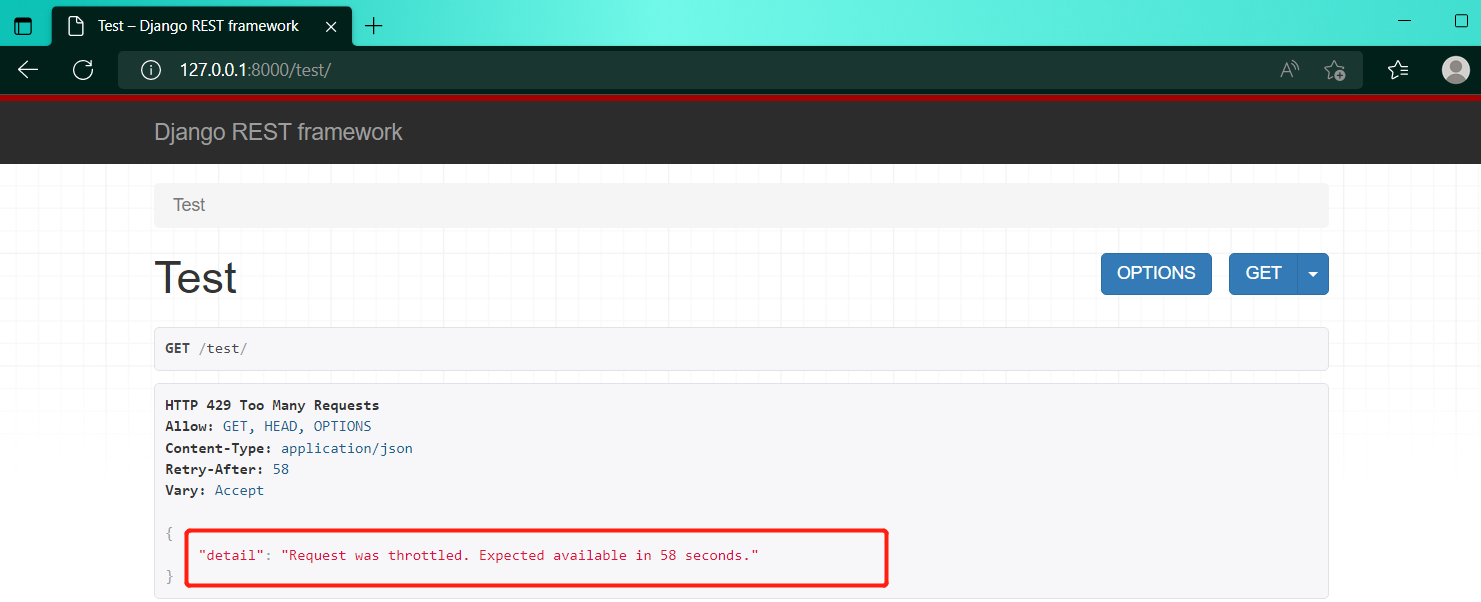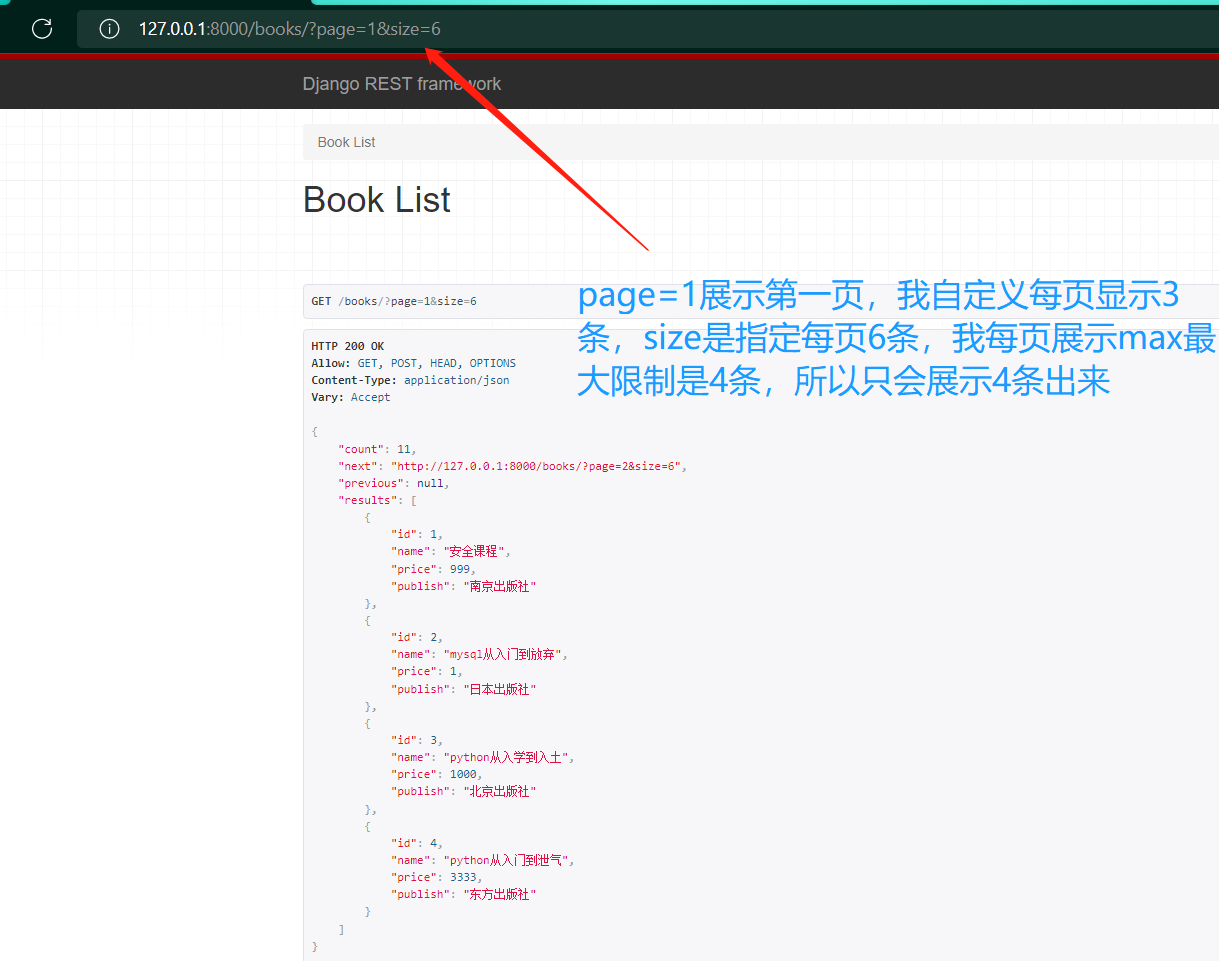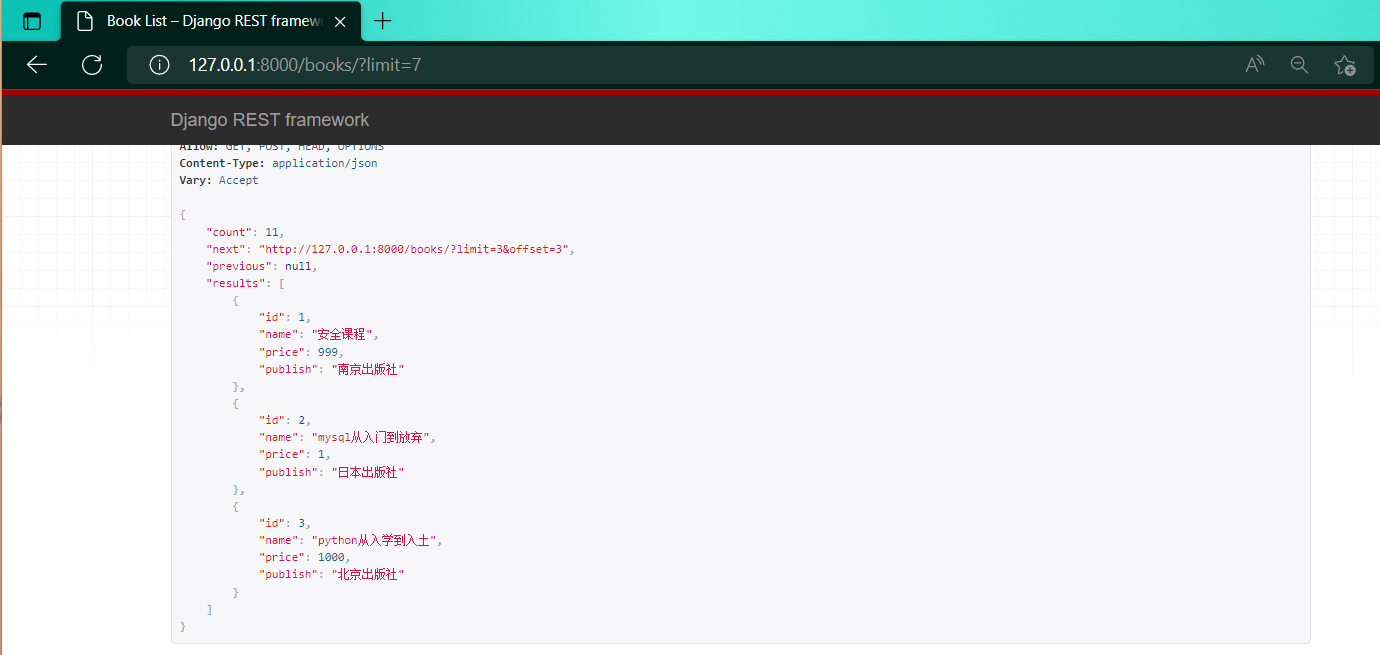drf8-分页-排序-过滤

1.自定义频率类简单测试
新建一个自定义频率类 throttling文件
from rest_framework.throttling import BaseThrottle
class MyThrottle(BaseThrottle):
VISIT_RECORD = {} # 存放用户访问记录{ip1:[时间1,时间2],ip2:[时间1,时间2],'192.168.1.101':[当前时间,]}
def __init__(self):
self.history = None
def all_request(self,request,view):
#在这里写逻辑,根据ip地址判断用户是不是超过了频率限制
#(1)取出访问者ip
ip = request.META.get('REMOTE_ADDR')
import time
ctime = time.time() #取出当前时间
#(2)判断当前ip不在访问字典里,添加进去,并且直接返回True,并且直接返回True,表示第一次访问。
if ip not in self.VISIT_RECORD:
return True
self.history = self.VISIT_RECORD.get(ip)
# 当前访问者的时间列表 [时间2,]
# (3)循环判断当前ip的时间列表,有值,并且当前时间减去列表的最后一个时间大于60s,把这种数据pop掉,这样列表中只有60s以内的访问时间,
while self.history and -ctime + self.history[-1] <60:
#循环结束后,剩下的都是1分钟以后的访问时间
self.history.pop()
#(4)判断,当列表小于3,说明一分钟以内访问不足三次,把当前时间插入到列表第一位置,返回True,顺利通过
#(5) 当大于等于3,说明一分钟访问超过三次,返回False验证失败、
if len(self.history) <3:
self.history.insert(0,ctime)
return True
else:
return False
def wait(self):
import time
ctime = time.time()
return 60 - (ctime - self.history[-1])
urls.py
不能自动生成路由,没有继承viewsetmixin,手动配置
from django.contrib import admin
from django.urls import path
from app01 import views
urlpatterns = [
path('admin/', admin.site.urls),
path('test/', views.TestView.as_view()),
]
views.py
from rest_framework.response import Response
from rest_framework.views import APIView
from rest_framework.viewsets import ModelViewSet
from .throtthling import ReThrottling
class TestView(APIView):
throttle_classes = [ReThrottling, ]
def get(self, request):
return Response('ok')

2.频率功能源码剖析
# SimpleRateThrottle
-源码里执行的频率类的allow_request,读SimpleRateThrottle的allow_request
class SimpleRateThrottle(BaseThrottle):
cache = default_cache
timer = time.time
cache_format = 'throttle_%(scope)s_%(ident)s'
scope = None
THROTTLE_RATES = api_settings.DEFAULT_THROTTLE_RATES
def __init__(self): # 只要类实例化得到对象就会执行,一执行,self.rate就有值了,而且self.num_requests和self.duration
if not getattr(self, 'rate', None): # 去频率类中反射rate属性或方法,发现没有,返回了None,这个if判断就符合,执行下面的代码
self.rate = self.get_rate() #返回了 '3/m'
# self.num_requests=3
# self.duration=60
self.num_requests, self.duration = self.parse_rate(self.rate)
def get_rate(self):
return self.THROTTLE_RATES[self.scope] # 字典取值,配置文件中咱们配置的字典{'ss': '3/m',},根据ss取到了 '3/m'
def parse_rate(self, rate):
if rate is None:
return (None, None)
# rate:字符串'3/m' 根据 / 切分,切成了 ['3','m']
# num=3,period=m
num, period = rate.split('/')
# num_requests=3 数字3
num_requests = int(num)
# period='m' ---->period[0]--->'m'
# {'s': 1, 'm': 60, 'h': 3600, 'd': 86400}[period[0]]
# duration=60
duration = {'s': 1, 'm': 60, 'h': 3600, 'd': 86400}[period[0]]
# 3 60
return (num_requests, duration)
def allow_request(self, request, view):
if self.rate is None:
return True
# 咱们自己写的,返回什么就以什么做限制 咱们返回的是ip地址
# self.key=当前访问者的ip地址
self.key = self.get_cache_key(request, view)
if self.key is None:
return True
# self.history 访问者的时间列表,从缓存中拿到,如果拿不到就是空列表,如果之前有 [时间2,时间1]
self.history = self.cache.get(self.key, [])
# 当前时间
self.now = self.timer()
while self.history and self.history[-1] <= self.now - self.duration:
self.history.pop()
if len(self.history) >= self.num_requests:
return self.throttle_failure()
return self.throttle_success()
# 总结:以后要再写频率类,只需要继承SimpleRateThrottle,重写get_cache_key,配置类属性scope,配置文件中配置一下就可以了
#过滤
restful规范中有一条,请求地址中带过滤条件,分页,排序,过滤统成为过滤
3.分页功能
查询所有的接口才需要分页、
#分页后端的写法是固定的,前端展现形式是不一样
-pc 端的下一页的点击
-app中,翻页是下拉加载更多
代码
models.py
from django.db import models
# Create your models here.
class Book(models.Model):
name = models.CharField(max_length=32)
price = models.IntegerField()
publish = models.CharField(max_length=32)
新建分页类
三种分页
PageNumberPagination, 基本分页 使用最多
LimitOffsetPagination, 偏移分页
CursorPagination 游标分页 大数据使用
pagination.py
from rest_framework.pagination import PageNumberPagination, LimitOffsetPagination, CursorPagination
#第一种正常分页,查询多条,使用最多
class MyPageNumberPagination(PageNumberPagination):
# 写4个类属性即可
page_size = 3 # 每页显示的条数
page_query_param = 'page' # 后缀/books>/page=3 查询第几页的参数
page_size_query_param = 'size' # /books/?page=3&size=4 #查询第三页,每页显示4条
max_page_size = 4 # 限制通过size查询,最大的条数
#
class MyLimitOffsetPagination(LimitOffsetPagination):
default_limit = 2 # 每页展示的条数
limit_query_param = 'limit' # /books/?limit=4 这一页显示4条数据
offset_query_param = 'offset' # /books/?offset=3&limit=4 从第3条开始,取4条数据
max_limit = 3 # 限制最多多少条
# 游标分页,只能上页下页,适用于大数据多的分页形式
class MyCursorPagination(CursorPagination): # 只能上一页和下一页,它的分页效率是最高的,高于上面所有的分页方式,大数据量的分页,建议使用这种
cursor_query_param = 'cursor'
page_size = 3 # 每页显示条数
ordering = 'id' # 排序,必须是表中得字段
views.py
from django.shortcuts import render
# Create your views here.
from rest_framework.mixins import CreateModelMixin
# 接口怎么写
# 想快速写五个接口,可以写modelviewset
# 想写获取所有接口,继承APIView可以写,继承GenericAPIView,继承GenericAPIview + listmodelmixin也可以
# 只想借
from .models import Book
from .serializer import BookSerializer
from rest_framework.generics import ListAPIView
from rest_framework.viewsets import ModelViewSet, ViewSetMixin
from .pagination import MyPageNumberPagination,MyLimitOffsetPagination,MyCursorPagination
from rest_framework.mixins import CreateModelMixin
class BookView(ViewSetMixin, ListAPIView,CreateModelMixin):
#必须继承GenericView
pagination_class = MyCursorPagination #MyPageNumberPagination MyLimitOffsetPagination
queryset = Book.objects.all()
serializer_class = BookSerializer


drf中分页的使用:
-写一个类,继承drf提供的三个分页类之一
-重写某几个类属性
-把它配置在继承自GenericAPIView+ListModelMixin的子视图类上
-如果继承的是APIView,需要自己写
page = MyPageNumberPagination()
res =page.paginate_queryset(qs,request)
4.排序功能
查询所有才会涉及到排序,其他接口都不需要
必须是继承GenericAPIView+ListModelMixin的子视图类上
-配置排序类:
filter_backends =[OrderingFilter,]
-配置排序的字段
ordering_felds=['id','price']
-支持前端的访问形式
# 先按价格的降序排,如果价格一样再按id的升序排
http://127.0.0.1:8000/books/?ordering=-price,id
5过滤功能
5.1内置过滤
查询所有才会涉及到过滤,像增,删 , 改,等接口都不需要
resful 规范中有一条,请求地址中带过滤条件:分页,排序,过滤,统称为过滤
使用内置过滤类使用步骤,查询所有才涉及到排序,其他接口都不需要
必须是继承GenericAPIView+ListModelMixin的子视图类上
-配置过滤类:
filter_backends = [SearchFilter,]
-配置过滤的字段
ordering_fields = ['name','publish']
-支持前端的访问形式
#只要name中或publish中或publish有三都唔那个搜出来,
#内置过滤类中只能通过search写条件,如果配置了多个过滤字段,是或者的条件
http://127.0.0.1:8000/books/?serarch=三
不够用,-要么第三方过滤类。
-自己写过滤类
model.py,urls.py不变
views.py
继承from rest_framework.filters import OrderingFilter,SearchFilter
from django.shortcuts import render
# Create your views here.
from rest_framework.mixins import CreateModelMixin
from rest_framework.response import Response
from rest_framework.views import APIView
from rest_framework.viewsets import ModelViewSet, ViewSetMixin
from .throtthling import ReThrottling
# class TestView(APIView):
# throttle_classes = [ReThrottling, ]
#
# def get(self, request):
# return Response('ok')
# 接口怎么写
# 想快速写五个接口,可以写modelviewset
# 想写获取所有接口,继承APIView可以写,继承GenericAPIView,继承GenericAPIview + listmodelmixin也可以
# 只想借
from .models import Book
from .serializer import BookSerializer
from rest_framework.generics import ListAPIView
from rest_framework.viewsets import ModelViewSet, ViewSetMixin
from .pagination import MyPageNumberPagination,MyLimitOffsetPagination,MyCursorPagination
from rest_framework.mixins import CreateModelMixin
from rest_framework.filters import OrderingFilter,SearchFilter
class BookView(ViewSetMixin, ListAPIView,CreateModelMixin):
pagination_class = MyCursorPagination #必须继承GenericView
queryset = Book.objects.all()
serializer_class = BookSerializer
# 排序类的配置
filter_backends=[OrderingFilter,]
# 指定按哪个字段排序
ordering_fields=['id','price']
# 指定过滤类
filter_backends=[SearchFilter,]
# 指定过滤字段
search_fields=['name','publish']
标签:
drf



【推荐】国内首个AI IDE,深度理解中文开发场景,立即下载体验Trae
【推荐】编程新体验,更懂你的AI,立即体验豆包MarsCode编程助手
【推荐】抖音旗下AI助手豆包,你的智能百科全书,全免费不限次数
【推荐】轻量又高性能的 SSH 工具 IShell:AI 加持,快人一步
· 阿里最新开源QwQ-32B,效果媲美deepseek-r1满血版,部署成本又又又降低了!
· 开源Multi-agent AI智能体框架aevatar.ai,欢迎大家贡献代码
· Manus重磅发布:全球首款通用AI代理技术深度解析与实战指南
· 被坑几百块钱后,我竟然真的恢复了删除的微信聊天记录!
· AI技术革命,工作效率10个最佳AI工具